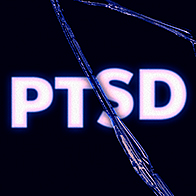When Both Partners Have Trauma, Relationships Can Be a Lot More Work

When one partner in a relationship has trauma, you can find plenty of advice on how to support that person. There's an extensive amount of research dealing with the responsibilities of partner burden, such as how the partner without trauma handles finances, household tasks and emotional support.
But what happens when both partners have trauma?
About 15 million adults have post-traumatic stress disorder (PTSD) during a given year, according to the U.S. Department of Veterans Affairs, and the National Council for Behavioral Health reports around 70 percent of Americans experience a traumatic event in their life.
With those statistics in mind, it's entirely possible there are multiple partners experiencing trauma or PTSD in a relationship concurrently. In such a scenario, each partner needs some tools to maintain the relationship.
How trauma affects partners
Whether trauma manifests as PTSD depends on a few factors, such as resources and support at the time of the incident, family history of mental illness, compounded stress after the event and history of childhood trauma.
A study published in Clinical Psychology Review notes PTSD is defined in three clusters: reexperiencing symptoms, such as flashbacks; avoidance, such as emotional numbing; and hyperarousal or hypervigilance. Of the three, the study found hyperarousal and emotional numbing affect romantic relationships most.
Bessel van der Kolk, trauma expert and author of the groundbreaking book on trauma, "The Body Keeps the Score," writes: "We have learned that trauma is not just an event that took place sometime in the past; it is also the imprint left by that experience on mind, brain and body." He also makes the point that trauma is not about the story of the external traumatic event that occurred, but rather, its impact is internal.
According to van der Kolk, trauma produces physiological changes and causes the brain to rewire its alarm system. Partners who have trauma might find their alarm system feels threatened by danger even when there isn't an actual threat.
'We have learned that trauma is not just an event that took place sometime in the past; it is also the imprint left by that experience on mind, brain and body.'
Simone Saunders, managing director of the Cognitive Corner and DiveThru therapist based in Alberta, Canada, said trauma can influence all areas of a relationship, including communication, emotional and physical intimacy, and financial and physical health.
"Typically, this looks like difficulties accepting love despite reassurance, fear of rejection or abandonment, heightened reactions to common relationships issues, such as arguments, boundaries, changes in sexual intimacy, etc., feelings of helplessness within the relationship and so much more," Saunders said.
Trauma can specifically present in conflict and conflict resolution, or when we feel stressed, unsafe or threatened, said Teressa Wilcox, L.M.F.T., a therapist at the Healing Center for Trauma & Relationships in Huntington Beach, California.
Whether or not partners have PTSD, trauma can cause the brain's alarm system to work on overdrive.
"Simply put, trauma activates our inner safety and survival instincts," Wilcox said. "When we feel threatened, either physically or emotionally, we are also activated and seek safety and survival. For a couple who have each experienced trauma, both may feel unsafe at times, overwhelmed at times and adversarial in conflicts."
How partners can navigate trauma
Individually, it's essential each partner does their own healing work, which might involve therapy, cultivating a support system, self-care and self-reflection, Saunders explained. It's also helpful to find a therapist who has experience working with trauma.
"As a unit, communication and vulnerability will be extremely important," Saunders said.
"Often, experiencing trauma comes with feelings of shame that may surface when there is a rupture within the relationship," she added. "Both parties need to be open to communicating the most vulnerable pieces of themselves in order to actively work through those things together and separately."
Trauma's imprint is especially likely to emerge during such ruptures, so it's crucial to have conflict management strategies in place.
"Recognizing when you are emotionally overwhelmed and taking time-outs to calm your system can help," Wilcox noted.
Wilcox highlighted the concept of flooding, a term coined by John Gottman, a world-renowned U.S. psychologist, that signifies an emotional hijacking of the nervous system. Signs you might be "flooded" may include raising your voice, increased heart rate, not hearing your partner, panic-attack-like feelings, shutting down or getting defensive. Nothing constructive comes from continuing a conversation once flooded, Wilcox said.
"When this happens, we are not rational, creative or able to engage in productive conflict management," Wilcox explained. "Gottman's research suggests it takes 20 to 30 minutes minimum to calm our physiology down and reactivate our creative brains."
Learning when you or your partner are emotionally hijacked is essential to managing ruptures. Words or hand gestures can also help signify a pause. During the ensuing break, do something relaxing, such as going for a walk, deep breathing or drawing.
Respecting triggers shows a partner cares about the other's trauma and wants to prioritize their well-being. Triggers manifest differently depending on the person and type of trauma they experience, but you may recognize them as specific sights, noises, sounds or images. In practice, attentiveness to another person's triggers might look like pressing pause on a movie that depicts a traumatic experience your partner endured.
Tools for working with trauma in relationships
To help understand your nervous system and access a regulated emotional state, Saunders recommended learning about polyvagal theory, which can allow an individual to understand how subtle and overt stimuli may trigger a nervous system response based on historic traumatic experiences.
The theory provides a framework for how someone's nervous system responds when overwhelmed: flight or fight, shutdown or feeling safe and secure. Another helpful lens, attachment theory, can help partners gauge how they show up in adult relationships with attachment injury, or unmet needs, from their caregivers in childhood.
Saunders advised frequent relationship check-ins. "Those check-ins can look however each couple chooses, but discussing what's going well and what could be improved upon, as well as what each person might need in the upcoming weeks, can be so beneficial," Saunders said. "That allows both parties to have a scheduled opportunity to reflect and communicate their needs, as well as give and receive critical feedback."
If you're failing to communicate productively or find that both partners are frequently flooded, therapy can help.
'[Checking in] allows both parties to have a scheduled opportunity to reflect and communicate their needs, as well as give and receive critical feedback.'
"When you find yourself having the same arguments over and over, it may be time to find a therapist," Wilcox said.
Therapy can be done together or individually. Wilcox suggested eye movement desensitization and reprocessing (EMDR) therapy in particular.
"EMDR helps put the past in the past so that we are free to be in the present and positively influence our future," Wilcox said.
The word "trauma" comes from the Greek word for wound. Understanding its derivation can help partners tap into their own compassion for what the other is experiencing when they may have an extreme reaction to something seemingly unthreatening.
"When we do some trauma work on ourselves, we are better able to show up in the moment for our relationships," Wilcox said.




















